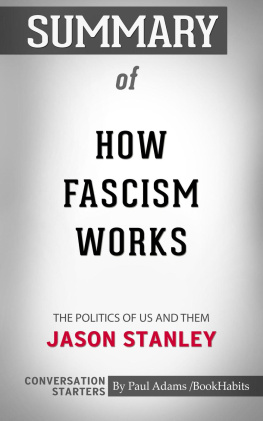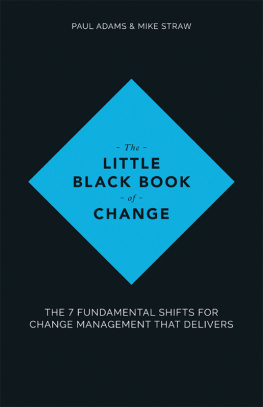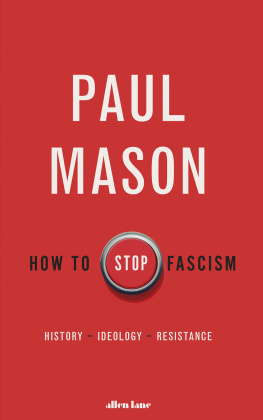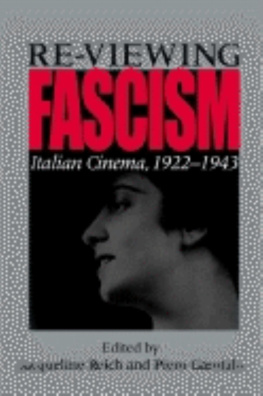Summary
of
How Fascism Works
Jason Stanley
Conversation Starters
By Paul Adams
Book Habits
Please Note: This is an unofficial Conversation Starters guide. If you have not yet read the original work, you can purchase the original book here.
Copyright 2018 by BookHabits. All Rights Reserved. First Published in the United States of America 2018
We hope you enjoy this complimentary guide from BookHabits. Our mission is to aid readers and reading groups with quality thought-provoking material to in the discovery and discussions on some of todays favorite books.
Disclaimer / Terms of Use: This guide is unofficial and unauthorized. It is not authorized, approved, licensed, or endorsed by the original book's author or publisher and any of their licensees or affiliates. Product names, logos, brands, and other trademarks featured or referred to within this publication are the property of their respective trademark holders and are not affiliated with BookHabits. The publisher and author make no representations or warranties with respect to the accuracy or completeness of these contents and disclaim all warranties such as warranties of fitness for a particular purpose.
No part of this publication may be reproduced or retransmitted, electronic or mechanical, without the written permission of the publisher.
Bonus Downloads
Get Free Books with Any Purchase of Conversation Starters!

Every purchase comes with a FREE download!
Add spice to any conversation
Never run out of things to say
Spend time with those you love

or Click Here.

Scan Your Phone
T ips for Using Conversation Starters:
EVERY GOOD BOOK CONTAINS A WORLD FAR DEEPER THAN the surface of its pages. Questions herein are designed to bring us beneath the surface of the page and invite us into the world that lives on. These questions can be used to:
- Foster a deeper understanding of the book
- Promote an atmosphere of discussion for groups
- Assist in the study of the book, either individually or corporately
- Explore unseen realms of the book as never seen before
Introducing How Fascism Works
H
ow Fascism Works: The Politics of Us and Them is a book written by Jason Stanley. A scholar and philosopher who has studied deeply how fascism can undermine democratic societies, Stanley is the child of refugees who escaped Nazi Germany. His thorough understanding of fascism's nature is laid out in the book. He says fascism can exist even in non-fascist societies, citing America's fascist roots that have existed for over a century already. Stanley points out the fascist tactics that have been at play in the United States and around the world and gives readers a view of their history and their rise today.
The author identifies the structures that uphold fascism, including the ten pillars that create a fascist politics, and the language and ideas that create a wedge between people and make classifications of "us" and "them". He shares his thoughts about the subject and how these are looked at from the lenses of sociology, history, philosophy, and race theory. He supports these with stories from modern-day Poland, Hungary, Myanmar, India, the United States, and other nations whose governments are attacked by fascist forces.
He also cites examples of past fascist leaders and their behavior. These include Hitler, Joseph Goebbels who is Hitlers propagandist, and Benito Mussolini. The author highlights historical accounts of liberal democracies which have treated refugees, immigrants, and city dwellers, as them. There is danger in not taking fascist tactics seriously, he says, because they can accumulate into a powerful force. These tactics include the promotion of a mythic idea of a nations history; the use of propaganda that confuse the language of democracy and its ideals; the downgrading of intellectuals and the scholarly tradition; the use of the courts and the law against minority groups; the incrimination of activities of labor groups, and attacks on the welfare system. Taken together, these fascist tactics create divisions among people that lead to a weak society that will easily succumb to proposals of authoritarian governance. Stanley presents the events and patterns apparent in todays political developments. He says We ought to see the patterns of fascist politics and resist it.
The book is written in a concise manner which can be easily understood. It explains the populist presidency of Trump, the Brexit phenomenon, the rise of Hungarian leader Orban who is supported by rightist politicians, the five-star movement and its roots in Italy, the authoritarian leadership of Erdogan, and many similar fascist developments around the globe. These are accounts that prove that fascism is on the rise according to Stanley.
His analysis and clear grasp of the concepts and ideas show fascisms reality today. He also gives a framework through which fascist tactics are recognized and understood. Critics agree that it is an essential guidebook to the current national dilemma of democracy vs. authoritarianism. In the book's introduction, Stanley tells the story of his father, Manfred, who was six years old when he escaped Nazi Germany with his mother in 1939. They arrived in New York City in August and remembers seeing the Statue of Liberty from their ship. In his old age and stricken with Parkinson's, Stanley's father visited the beaches of Normandy. It was a lifelong dream for him to see the place where many Americans lost their lives fighting against fascism. The introduction also mentions the story of Charles Lindbergh who promoted the America First movement in the same year that Stanley's father escaped Germany and arrived in the US. Stanley says the America First movement "was the public face of pro-fascist sentiment in the United States at that time." Stanley cites the roots of fascist elements in America as early as then.
The book is met with praise and approval from critics. Author William Jelani Cobb says the book shows how the fascist elements in the past are still present in America today. It presents a disturbing set of facts that should serve as a guidebook for all. Author Jan T. Gross says the book comes at a most propitious time, when we must come to grips with the political consequences that may follow the rise of xenophobic populism.
He cites the importance of history in teaching consequences of fascism. He recommends it as a must-read for all responsible citizens. Author and filmmaker Errol Morris says the book is important in showing that "fascism is not a plan on how to govern but a plan on how to seize control." He asks the question of how we as citizens, stop fascism. Stanley's book makes the clarion call for people to "wake up [and] pay attention." Pulitzer Prizewinning author Heather Ann Thompson points out Stanley's emphasis on the "resurrection of ugly myths" as part of the fascist tactics. She lauds Stanley for making clear and deconstructing such myths and in the process..." we remember the extraordinary ties that in fact bind us together." She reminds readers that modern-day fascism is myth-dependent in promoting "intolerance, xenophobia, and fearmongering in which we find ourselvescan be rendered to ash."
Next page

























